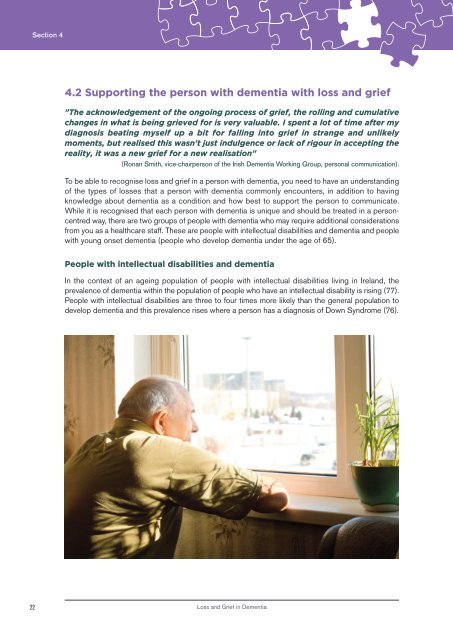Loss and Grief in Dementia
Final-Guidance-Document-3-Loss-Grief
Final-Guidance-Document-3-Loss-Grief
You also want an ePaper? Increase the reach of your titles
YUMPU automatically turns print PDFs into web optimized ePapers that Google loves.
Section 4<br />
4.2 Support<strong>in</strong>g the person with dementia with loss <strong>and</strong> grief<br />
"The acknowledgement of the ongo<strong>in</strong>g process of grief, the roll<strong>in</strong>g <strong>and</strong> cumulative<br />
changes <strong>in</strong> what is be<strong>in</strong>g grieved for is very valuable. I spent a lot of time after my<br />
diagnosis beat<strong>in</strong>g myself up a bit for fall<strong>in</strong>g <strong>in</strong>to grief <strong>in</strong> strange <strong>and</strong> unlikely<br />
moments, but realised this wasn't just <strong>in</strong>dulgence or lack of rigour <strong>in</strong> accept<strong>in</strong>g the<br />
reality, it was a new grief for a new realisation"<br />
(Ronan Smith, vice-chairperson of the Irish <strong>Dementia</strong> Work<strong>in</strong>g Group, personal communication).<br />
To be able to recognise loss <strong>and</strong> grief <strong>in</strong> a person with dementia, you need to have an underst<strong>and</strong><strong>in</strong>g<br />
of the types of losses that a person with dementia commonly encounters, <strong>in</strong> addition to hav<strong>in</strong>g<br />
knowledge about dementia as a condition <strong>and</strong> how best to support the person to communicate.<br />
While it is recognised that each person with dementia is unique <strong>and</strong> should be treated <strong>in</strong> a personcentred<br />
way, there are two groups of people with dementia who may require additional considerations<br />
from you as a healthcare staff. These are people with <strong>in</strong>tellectual disabilities <strong>and</strong> dementia <strong>and</strong> people<br />
with young onset dementia (people who develop dementia under the age of 65).<br />
people with <strong>in</strong>tellectual disabilities <strong>and</strong> dementia<br />
In the context of an age<strong>in</strong>g population of people with <strong>in</strong>tellectual disabilities liv<strong>in</strong>g <strong>in</strong> Irel<strong>and</strong>, the<br />
prevalence of dementia with<strong>in</strong> the population of people who have an <strong>in</strong>tellectual disability is ris<strong>in</strong>g (77).<br />
People with <strong>in</strong>tellectual disabilities are three to four times more likely than the general population to<br />
develop dementia <strong>and</strong> this prevalence rises where a person has a diagnosis of Down Syndrome (76).<br />
22<br />
<strong>Loss</strong> <strong>and</strong> <strong>Grief</strong> <strong>in</strong> <strong>Dementia</strong>


